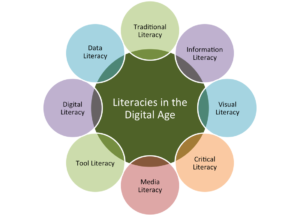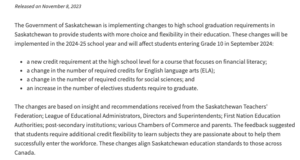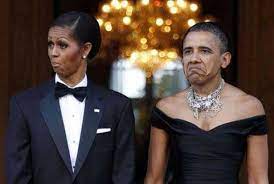To be (fully literate) or not to be (fully literate)
To be literate has expanded exponentially from the traditional definition in one’s ability to read and write. In my opinion, it has expanded to core aspects of human abilities and skills needed in the contemporary world. This includes aspects of everyday life such as social etiquette, mathematical, digital, media, health, and cultural, to name a few. With each of these aspects, there are of course subtopics in each that are important to identify and understand. I will point out a few and connect them with our current educational system, my own thoughts, and in conjunction with some of the readings we have looked at this week. 
Social literacy: Although social literacy has expanded in many ways, I will address it in regard to society’s further understanding of neurodivergences. As science and other areas have been able to study and report on neurodivergences, evidence now exists for the understanding of varying abilities in social literacy. An example of this would be students with Autism Spectrum Disorder. Education has responded appropriately (generally speaking) with specific programming or educational adaptations, if required, for students who do not naturally possess social literacy skills in accordance with their age, grade, or otherwise. Within these programs and adaptations, there is great work being done to develop such skills for students, just as other literacies are being developed in general education classrooms. To better illustrate what I am trying to say, I’ll provide an example:
My mom is an educational assistant at a high school and their Functionally Integrated Alternative Program (FIAP) classroom is proudly responsible for the Royal Beans program where the teachers can submit coffee orders and then are delivered their orders each Friday by the FIAP classroom student groups. The students in her classroom receive direct instruction and practice in expanding and developing their social literacy skills with their particular assignments/roles in their respective Royal Beans groups; they practice conversational skills for when delivering orders to teachers, customer service skills and diplomacy when interacting with their specific delivery crew, etc.
As important as the above example is, there is also significance in the expansion of understanding and compassion (another aspect of social literacy) of the neurotypical population with examples like this.
Mathematical literacy: As we see in the recently updated graduation requirements from the government of Saskatchewan, there is an expansion and clearly growing need for financial literacy and space has been given to such a need in the high school setting, proving the government can see ways in which education needs to shift alongside societal needs. With the rate of inflation continuing to rise without wages being able to keep up, financial literacy is desperately needed for students to be able to survive with such growing economic imbalances.

Media/digital literacies: Here is where I can really drive home some of the readings from this week! I think media/digital literacy is of utmost importance when considering how literacy has expanded and the most modern interpretation of what it means to be fully literate. Of course, EC&I 832 is aimed toward developing our own digital literacies as well as understanding how important such a literacy is for

students (and society). The lack of attention to media/digital literacy in the school system is exactly why I chose to create a proposed digital literacy high school elective for my final project and I hope, in the near future, such a course is adopted by divisions or, further yet, part of provincial graduation requirements like the newly required financial literacy. The reliance on smart phones has led society to a point where we can no longer ignore the media/digital illiteracies that students (and adults for that matter) have or can develop. Kim’s video poignantly points out that information is now “crafted” for the viewer and the inability to differentiate between crafted information and true information is problematic in a student’s ability to develop media literacy, in particular. Misinformation and the ‘fact checking’ skill, as Kim mentions, is not new, yet in the age of digital media, there is an increasing and alarming need for verifying information. George also offers great reasoning (the AI Alec) for needing to equip students with the skills to identify fake news/information as a form of protection from being victimized by the overwhelming amount of misinformation available at their fingertips, which Grosseck and Malita underscore (344). George’s chosen article articulates and solidifies my reasoning for focusing on a digital literacy course proposal for my final project – it is a critical skill and course for current and future students as media and the digital world continue to intertwine with most, if not all, aspects of contemporary society/life. Don’t get me wrong, I am happy financial literacy is now a grad requirement, but I am a little bit shocked digital literacy has not yet been made a course let alone a grad requirement, considering the digital age society operates in. To end on a more positive note, I think Graeme makes a great point about the positives of digital literacy, including educational training opportunities and the skill of simply having fun with digital advancements. We have seen the fun that can be had in our class with the different AI tools available that can create an image of practically anything we can dream up, which I think bridges a gap for students who have great imaginations, but like me, not the practical or physical art skills to make them come to life.

To end off, I think the traditional sense of literacy (reading and writing) has expanded and now become the base for which other literacies have grown; society still relies upon reading and writing for the other literacies, but the vehicle of response has expanded beyond simply reading and writing and expanded ways of knowing, producing, and articulating. This is something, I think, is good for society IF the value of contemporary literacies are recognized and taught to ensure well-rounded literacy skills for the future of our society. In other words, if we can revamp grad requirements for a singular type of literacy (while simultaneously diminishing others…sigh…), then we should probably revamp/reconsider courses offered/not offered for other literacies to ensure students are graduating high school with general and practical literacies needed for whatever their post-secondary ventures are.
Hi Jacquie. I agree with your observations on general literacies in the education our students. We are seeing more students with different/neurodivergent conditions that require adaptations. I sure enjoyed hearing about the Royal Bean program. Schools/teachers need to be given support to adapt and create functional education initiatives. Using technology in practical ways can show our students that media literacy is important when applied to functional tasks. Financial Literacy is a practical credit that some schools are already teaching at the 20/30 levels. It has lots of practical skill development that leads into applying math to life. Basic skills of reading and writing go beyond just comprehending and creating. Guiding the response process fits nicely with teaching students how to understand the information received (from the internet) and create a comprehensible response. I agree that digital citizenship and media literacy will become cross curricular in the future of classrooms, and that we need to give it more due diligence. I like your approach of designing a course that can bridge the gap that we presently see in our schools. Great informative post! Thanks
Great points in your post Jacquie!
You did a good job of explaining how literary and the skills associated with it have changed over time. Now, simply thinking about literacy as reading and writing are too limiting to what literacy can and should be. It is about how people can interact with the world around them to find meaning in all kinds of ways, and our school system should try to reflect that too. Great work on this!
Comment
Hey Jacquie, thanks for bringing up the recent change in graduation requirements which I am sure is on many minds right now! I think the addition of the Financial Literacy requirement is an interesting one, as it shows what types of literacies we are currently valuing the most. Clearly, there was a demand for a greater sense of financial literacy among young people. With the removal of required English and Humanities credits however, it seems to me that those literacies are no longer seen as valuable in today’s society. Who decides what literacies are the most valuable? Food for thought.
Jacqui, thank you for sharing your thoughts. I totally agree with your perspective. I agree fully that education must become agile enough to change or adapt to the current needs of society. It cannot be that the world around us is changing and the education system remains static. Kudos to the Saskatchewan government for proposing changes to the curriculum and graduation requirements for students.
The digital world is our current reality, we must navigate it and equip our students with the requisite skills to identify the pitfalls (fake news, phishing websites, etc) that exist in this new world. Thus making these adjustments to the curriculum (teaching digital literacy, and mathematical literacy with an emphasis on financial literacy) has to be the new paradigm.
Hi Jacquie,
I agree with you that students need to learn financial literacy as part of the mathematical literacy. The inclusion of financial literacy in high school graduation requirements is a much-needed adaptation to address contemporary economic challenges. Equipping students with the skills to navigate financial complexities is essential, given rising inflation and wage disparities right now.
Comment
I agree that literacy is multi-dimensional. While I applaud the inclusion of financial literacy as a required subject in Saskatchewan schools – the age at which it is being introduced (grade 10) seems like a bit of a missed opportunity. I feel my grade 12 students would be better served with this course as they are about to transition into adulthood and concepts such as mortgages, investing, and economics might be a bit more pressing for them. I would like to echo Cole has stated in his comment – this is less of a response (in my opinion) to the needs of the day and more of a statement of what is important to the current government and electorate. Social studies and English are both seeing reductions in mandatory courses – which as a math teacher I find strange because strong literacy skills underpin student success in mathematics – particularly in problem solving and reasoning. Computational skill is a component of mathematical literacy – but only a small one. I think media literacy goes hand in hand with an informed electorate and I can’t help but notice social studies being pushed to the side. It makes me a bit cynical and suspicious.
Fantastic, well-laid out post, Jacquie. It really helped me wrap my head around multiple literacies – I wish I had read it before posting my own this week. Like you, I am stunned that digital literacy has not become a prerequisite for graduating. When I began researching for my final project, I learned that in a school of 10 teachers, I am 1 of 2 who incorporate digital literacy and citizenship throughout my lessons. The others candidly admitted to not touching these topics because they feel unsure about the content. I should be shocked, but being the online consultant for my division for 2.5 years (with a digital window into everyone’s day-to-day lessons) showed me that this is the norm. Digital/media literacy is not being consistently incorporated with other literacies…more must be done. This is also why I am creating a cross-curricular digital literacy course for middle years (in hopes of sharing it across my division). Thanks for sharing.